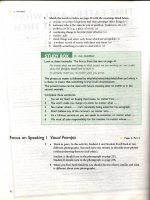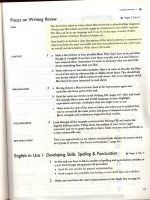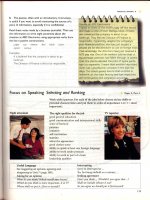A lot or Alot? ppsx
Bạn đang xem bản rút gọn của tài liệu. Xem và tải ngay bản đầy đủ của tài liệu tại đây (11.45 KB, 3 trang )
A lot or Alot?
A lot should be written as two words. Although a lot is used informally to
mean "a large number" or "many," avoid using a lot in formal writing.
Example: "The crook had many (not a lot of) chances to rob the stranger."
A or An?
According to The Oxford Dictionary of American Usage and Style, "The
indefinite article a is used before words beginning with a consonant sound,
including /y/ and /w/ sounds. The other form, an, is used before words
beginning with a vowel sound. Hence, a European country, a Ouija board, a
uniform, an FBI agent, an MBA degree, an SEC filing. Writers on usage
formerly disputed whether the correct article is a or an with historian,
historic, and a few other words. The traditional rule is that if the h- is
sounded, a is the proper form. Most people following that rule would say a
historian and a historic e.g.:'Democrat Bill Clinton appears within reach of
capturing the White House in Tuesday's election, but Republicans hope that
late momentum, can enable President Bush to win a historic upset' (Dallas
Morning News). Even H.W. Fowler, in the England of 1926, advocated a
before historic(al) and humble (MEU1).
The theory behind using an in such a context, however, is that the h- is very
weak when the accent is on the second rather than the first syllable (giving
rise, by analogy, to an habitual offender, an humanitarian, an hallucinatory
image, and an harassed schoolteacher). Thus no authority countenances
an history[emphasis added], though a few older ones prefer an historian
and an historical.
Today, however, an hypothesis and an historical are likely to strike readers
and listeners as affectations. As Mark Twain once wrote, referring to
humble, heroic, and historical: 'Correct writers of the American language do
not put an before those words' (The Stolen White Elephant,1882). Anyone
who sounds the h- in such words should avoid pretense and use a (Garner 1).
Accept or Except?
Accept is a verb meaning "to receive" or "to approve." Example: "I accept
your offer of the book." Except is a verb meaning "to leave out" or "to
exclude." Example: "He excepted all Corvettes from his list of favorite
cars." Except can also be a preposition meaning "excluding" or "leaving
out." Example: "He liked everything on the plate except the liver."









